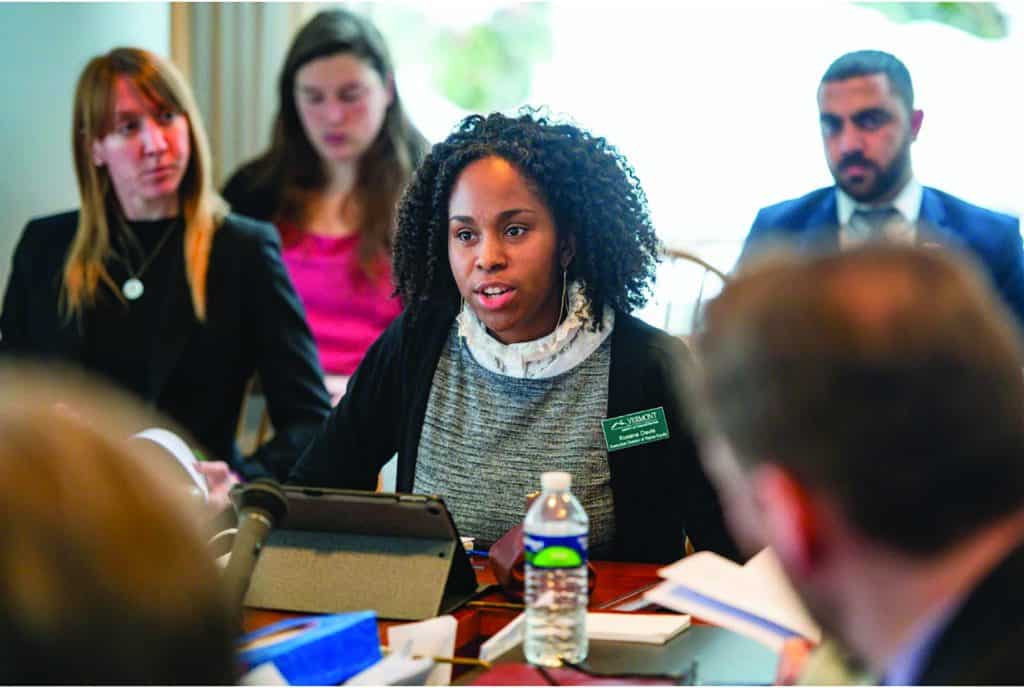
Xusana Davis, executive director of Racial Equity for the Agency of Administration, testifies before a House committee at the State House in Montpelier in February.
By Kit Norton/VTDigger
Gov. Phil Scott has proposed putting $2 million toward stimulus payments for Vermonters who were ineligible to receive $1,200 in federal Covid-19 stimulus checks this spring.
In the budget proposal sent to lawmakers last week is a plan to help Vermonters who filed federal and state income taxes without using Social Security numbers, and so were disqualified from getting federal money.
Under the proposal, one-time payments of $1,200 would go to adults and $500 to children whose immigration status made them ineligible for CARES Act money.
“The point of this is parity and equity,” said Xusana Davis, the Scott administration’s executive director of racial equity.
“We’re not asking for anything more
than what other people in this state were given under the CARES Act,” she said.
The $2 million in coronavirus assistance is part of just $14 million in new programs outlined in the governor’s plan for $1.66 billion in general fund spending — the main source of state government money.
Normally, the governor would have signed a budget into law in May, weeks before the start of the new fiscal year on July 1. But the pandemic threw a wrench into this year’s budget process. In the spring, lawmakers and the governor crafted a partial budget to fund the first quarter of fiscal 2021, which began July 1, and scheduled a legislative session for August and September to come up with a budget for the remaining nine months.
The Scott administration’s proposed $2 million state-funded Covid-19 assistance program resembles a $75 million Disaster Relief Assistance fund for immigrant workers in California that Democratic Gov. Gavin Newsom announced this spring. Scott is a Republican.
“This is not unique by any stretch of the imagination,” Davis said. “A lot of jurisdictions have recognized how harmful the CARES Act distribution scheme was to vulnerable populations.”
The Democrat-controlled Legislature had considered an assistance program for migrant farmers with some of the $1.25 billion the state received from the federal government in April to cover expenses related to the Covid-19 crisis. However, the plan was not approved. Lawmakers worried that guidelines for using the federal money would block the program, and that the program could give the Trump administration information on the state’s undocumented population.
Migrant Justice, a human rights organization that advocates for undocumented Vermonters who work on the state’s dairy farms, had pushed for a $5.3 million fund before lawmakers went into recess June. 26.
On Aug. 14, the group announced it had raised money from individuals, foundations and national organizations to create a “Covid Solidarity Fund,” which has given more than 400 immigrant farmworkers and family members direct aid payments of $420 each.
Will Lambek, a Migrant Justice spokesperson, said that while the organization was able to raise money to help migrant farmers, it is “ultimately a state responsibility” to do so.
Lambek added that, based on the organization’s estimate of how many people did not receive federal stimulus checks, a little more than $5 million is needed to properly fund a state assistance program.
“The governor’s proposal of $2 million is a good start and we’ll be working with the Legislature and the administration during the next several weeks to try to fully fund this program,” he said.
Sen. Ruth Hardy, D-Addison, who’s on the Senate agriculture committee — the panel that spent a lot of time on the Legislature’s potential immigrant worker relief plan — said Friday she was glad to hear that the Scott administration had its own plan.
Hardy said that, based on lawmakers she has spoken with, there is support for this type of state relief fund, but one challenge the Senate faced was getting an accurate estimate of how many people needed assistance. Numbers ranged from 500 people to more than 1,500.
“The fact that it is in the governor’s budget and that there is fairly widespread support for it, I think it’s got good chances,” she said. “But you know how budgets are and this one’s going to be a tough one.”
Scott’s budget proposal went to the House Appropriations Committee and Chair Kitty Toll, D-Danville, said it is far too early to declare support for the $2 million proposal.
“It’s something that we’re very concerned with,” Toll said of supporting people excluded from federal stimulus checks.
Toll said her committee needs to hear testimony on the proposal and better understand it before deciding whether to support it.
“We need to find out how many Vermonters it includes, and make sure the $2 million cost is accurate,” she said.
Senate President pro tem Tim Ashe, D/P-Chittenden, said last week that he is inclined to support the governor’s proposal and any plan that “provides funds to any people who are critical to keeping our economy going.”
Ashe emphasized that a number of people working on the front lines in the heart of the Covid-19 state of emergency have still not received additional money for staying on the job.
“We have people who were working in high-risk situations for months who had no choice — in addition to the farmworkers — who did not receive hazard pay and I’m determined that we not forget them either,” Ashe said.




